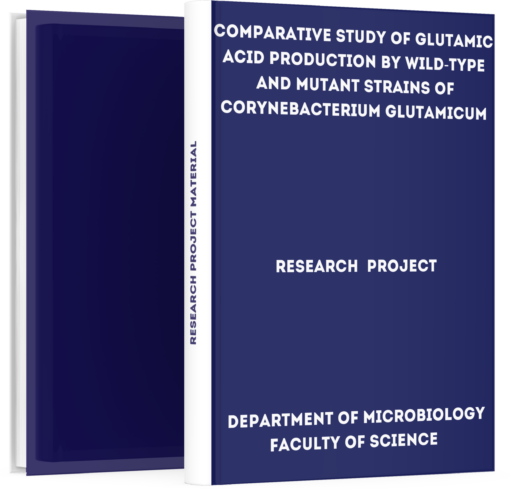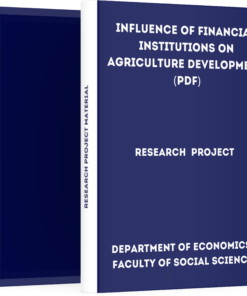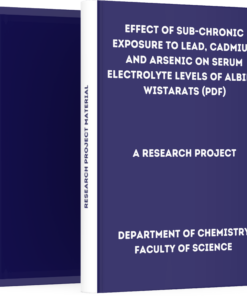Comparative Study of Glutamic Acid Production by Wild-Type and Mutant Strains of Corynebacterium Glutamicum
₦3,000.00
If you are interested in getting this project material “Comparative Study of Glutamic Acid Production by Wild-Type and Mutant Strains of Corynebacterium Glutamicum”, click on the DOWNLOAD BUTTON to make payment and the file will be delivered to your email immediately after confirmation.
Description
– Comparative Study of Glutamic Acid Production by Wild-Type and Mutant Strains of Corynebacterium Glutamicum –
Download Comparative Study of Glutamic Acid Production by Wild-Type and Mutant Strains of Corynebacterium Glutamicum. Students who are writing their projects can get this material to aid their research work.
Abstract
Several different lignocellulosic biomass of agricultural origin hold remarkable potential for conversion into commodity products presenting dual advantage of sustainable resource supply and environmental quality.
There is generally an increasing demand for amino acids especially L-glutamic acid as growth promoting factor, as well as flavour enhancer in foods.
The present study was an investigation on comparative L-glutamic acid production by wild-type and a mutant strain of Corynebacterium glutamicum (CGNTA) using rice husk pretreated with 1.0M H2SO4 and 1.0M KOH.
The acid-treated and alkali-treated rice husk with high carbohydrate content of 64.25% and 76.37% respectively as determined, were used for the production of glutamic acid by submerged fermentation.
The acid-treated and alkali-treated rice husk at concentration of 4% gave the highest glutamic acid yield of 27.84g/L and 15.72g/L respectively with the developed mutant strain (CGNTA) under predetermined optimum fermentation conditions (30oC, pH 7.0, 4% substrate concentration and 7% inoculum size).
In contrast, lower yields of 10.40g/L and 9.08g/L respectively were obtained with the wild type strain under similar optimum culture conditions. Out of four parameters optimized, all were found to significantly (p˂ 0.05) influence glutamate production from both the acid and alkali-treated rice husk by the CGNTA.
Similarly, all parameters except variation in the concentrations of the acid and alkali-treated rice husk (p˂ 0.05) were found to be significant on the performance of the wild-type strain in glutamate production.
Introduction
1.1 Background of the Study
Corynebacterium glutamicum is a rod-shaped Gram-positive aerobic bacterium, which can be found in soil, sewages, vegetables, and fruits (Eggeling and Bott, 2005). This bacterium is capable of utilizing various sugars as well as organic acids (Blombach and Seibold, 2010).
Among others, C. glutamicum has the ability to metabolize glucose, fructose, and sucrose as well as lactate, pyruvate, and acetate (Blombach and Seibold, 2010);
additionally, C. glutamicum has the ability to grow on mixtures of different carbon sources with a monoauxic growth (Wendisch et al., 2000) as opposed to diauxic growth observed for many other microorganisms such as Escherichia coli and Bacillus subtilis.
Only a few exceptions have been reported as in the case of glucose-ethanol or acetate-ethanol mixtures, where preferential substrate utilization was observed (Zahoor et al., 2012). Since its discovery, C. glutamicum has become an indispensable microorganism for the biotechnological industry (Wendisch, 2014).
With the development of amino acid market, a new era for the production of these amino acids by many companies and academic associations have enthusiastically arisen with the start of research and development in this field to increase the rate of amino acid production.
This technological race has expedited the expansion of amino acid production by various methods. Thus, almost all the amino acids can be produced by any of the four methods which include; chemical synthesis, protein hydrolysis, enzymatic synthesis and fermentation.
However, industrially, the most advantageous and economical method used for amino acids manufacture is microbial method, that is fermentation (Ikeda, 2003).
How to Download this Project Material
First, note that we are one of the best and most reliable online platforms because we don’t retain any of your personal information or data as regards making payments online.
PRICE: ₦3,500 ₦3,000 (Three Thousand Naira Only)
Make a bank deposit or mobile transfer of ₦2,000 only to the account given below;
Bank Name: UBA Account Number: 1022564031 Account Name: TMLT PRO SERVICES
After making the payment, CLICK HERE to send the following on WhatsApp;
- Depositor’s Name or Screenshot of Payment
- Name of the Past Question
- Active Email Address
or Call Us On +2348082284439 Once your details have been received and your payment confirmed by us, you will receive the past question in your email or WhatsApp within 5 Minutes.
Guarantee of Getting the Material
We understand that due to the high rate of fraud, many people are afraid of making purchases online but be rest assured that PastExamQuestions will deliver your material after payment.
Once your details have been received and your payment confirmed by us, you will receive the past question in your email or WhatsApp.
Give us Feedback
Have we been able to satisfy you? How well do you think the material will be helpful after having gone through it? Does the price worth the material?
Let’s hear from you! We recommend that our customers give feedback at the end of every transaction to enable us to serve better. You can do this by clicking the review button on this page.
Where is the review button? >> Just scroll up to where you see reviews





Reviews
There are no reviews yet.